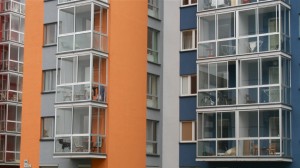
While many Lithuanians would like to live in neighborhoods like Vilnius' Šiaurės Miestelis, but whether they can afford to in this economy is another story. Photo by Nathan Greenhalgh.
VILNIUS — How is the crisis affecting where Lithuanians choose to live?
Some real estate market analysts say the people are moving into urban centers to save on commuting costs, while others argue that those on the outskirts are typically too poor to do so.
Real estate agent Rimas Kirdulis says that now during the economic crisis when prices were falling, people were moving closer to the center to utilize public transport and other utilities.
Kirdulis, who formerly worked for real estate company Inreal and now works for Apus Turtas, was quoted in business daily Verslo Žinios saying he estimates suburban housing prices have decreased by 50 percent since the peak of the boom.
“During these years, houses that are more remote from urban infrastructure, rapidly lose value and this is directly linked to people’s lives and changes of circumstances,” he said.
He said that people are becoming more aware of the savings that can be made if they live close the center.
Stuck living on the edge
Oberhaus, one of the largest real estate companies in the region told Baltic Reports that the claims had little evidence to back them up.
“There is no difference to when the house is. The decrease in house prices in Vilnius is the same over all. We can’t say the decreases in suburbs is 50 percent and center is 30 percent. There are no statistics,” Saulius Vagonis, marketing manager for Oberhaus said.
Vagonis said most people living in a house on the outskirts could only hope to buy a flat in the center after selling up on the edge of town.
“In general the decreasing of prices outside the city and inside the city is the same. At this moment people want to buy a house closer to the center, but they are still at a higher price,” Vagonis said. “If you change the house into an apartment closer to the city center and infrastructure and schools, some people will be doing this by selling their house or just buying an apartment.”
Oberhaus research showed that from the peak of the real estate boom until now residential real estate prices had dropped by 30-40 percent across the board. In the last 12 months, the drop has been around 30 percent.












